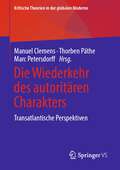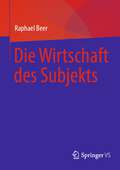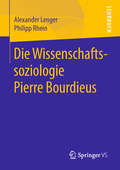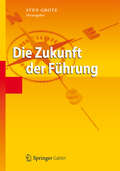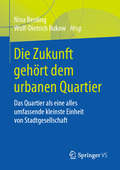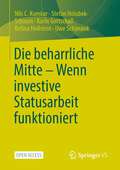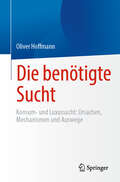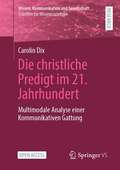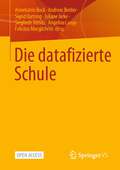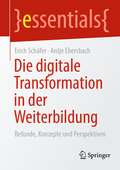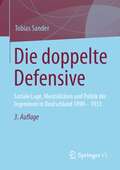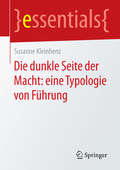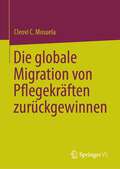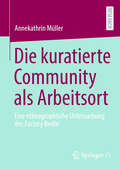- Table View
- List View
Die Vogelsang-Schule
by Justin StaglDas Buch untersucht die historische Dynamik der Lehre des katholischen Sozialreformers Karl von Vogelsang. Es folgt dem Denken und Wirken dreier Generationen seiner Schüler zwischen 1880 und 1960 in der österreichischen Monarchie, der Ersten und der Zweiten Republik und in der Weltkirche .Es behandelt dabei die konservative Kritik an Liberalismus und Kapitalismus, den föderalistischen Korporatismus, den Laizismus in der Kirche mit dem politischen, sozialen und kulturellen Katholizismus und die Reaktion darauf im Integralismus, die Entstehung „christlich-sozialer“ Parteien, eine konservierende Haltung zur Natur und gewachsenen Sozialbeziehungen, schließlich auch den Antijudaismus.
Die Wiederkehr des autoritären Charakters: Transatlantische Perspektiven (Kritische Theorien in der globalen Moderne)
by Manuel Clemens Thorben Päthe Marc PetersdorffWer sich in den letzten Jahren mit dem autoritären Charakter beschäftigt, begibt sich stets in die etwas paradoxe Gefahr, von einer noch älteren Version dieser Figur überholt zu werden. Was in den anti-autoritären 1970er Jahren durch unhaltbar gewordene Prämissen auf theoretischer Ebene abgebaut, in komplexer gelagerte Machtdiskurse überführt und durch Reformen in den pädagogischen, medialen und politischen Institutionen auf praktischer Ebene überwunden oder zumindest gezähmt zu sein schien, taucht Mitte der 2010er Jahre überraschend ‚originalgetreu‘ wieder auf und scheint sich seitdem in permanenter Annäherung an seinen Ursprung zu aktualisieren. Wie verfährt man also mit dem autoritären Charakter? Der vorliegende Sammelband versucht, diese Frage auf zwei Wegen anzugehen. Zum einen nimmt er die Gefahr in Kauf, in seinen Bestandsaufnahmen von aktuellen Entwicklungen überholt zu werden. Zum anderen begibt er sich selbst an den Ursprung zurück und versucht in den ersten Überlegungen der Frankfurter Schule und den Versuchen, den autoritären Charakter zu erforschen, bisher unbeachtete Stellen zu beleuchten. Allerdings ist auch bei einer solchen Rückkehr klar, dass sie nicht am Ursprung stehen bleiben kann. Es sind dann wiederum diese geschärften bzw. revidierenden Betrachtungen, mit denen etliche AutorInnen die Frage für die Gegenwart erneut stellen.
Die Wirkung von Yoga auf die Lebensqualität und das Wohlbefinden von Bewohner*innen stationärer Altenpflegeeinrichtungen: Möglichkeiten und Grenzen (Dortmunder Beiträge zur Sozialforschung)
by Svenja HeltenIn diesem Buch rückt das „gute Leben“ im hohen Alter in den Fokus: So ist in den westlichen Industrienationen ein stetiger Anstieg der allgemeinen Lebenserwartung zu verzeichnen. Die gewonnene Lebenszeit geht jedoch nicht automatisch mit einem guten Gesundheitszustand einher: Gerade Hochaltrige sind häufig von einer oder mehreren chronischen Erkrankungen betroffen, die mit zahlreichen funktionellen Einschränkungen in ihrem Alltag verbunden sind und oftmals den Umzug in eine stationäre Einrichtung der Altenpflege bedingen. Die damit verbundenen Umstände bergen das Risiko, die Lebensqualität der Betroffenen zu verringern. Eine Fördermöglichkeit könnte in der Einführung von Yoga-Kursen bestehen, da empirische Untersuchungen mit verschiedenen Studienpopulationen die Schlussfolgerung nahelegen, dass sich eine regelmäßige Yoga-Praxis positiv auf verschiedene Parameter auswirkt, die mit den Konstrukten von Lebensqualität und Wohlbefinden assoziiert sind. Für die vorliegende Arbeit wurde daher ein Yoga-Kurskonzept entwickelt, das den Bedürfnissen von Bewohner*innen von stationären Altenpflegeeinrichtungen ohne Demenzerkrankungen gerecht zu werden anstrebt und in Form einer Pilotstudie in einer stationären Altenpflegeeinrichtung erprobt.
Die Wirtschaft des Subjekts
by Raphael BeerMit dem Subjektbegriff wird auf eine logisch nicht hintergehbare Entität verwiesen, die sich aus den Überlegungen einer konstruktivistischen Erkenntnistheorie ableiten lässt. Gewonnen wird damit aber zunächst nur die Idee einer reinen Subjektivität, die nicht unmittelbar für gesellschaftstheoretische Fragen fruchtbar ist. Dies soll mit dem Fokus auf die Wirtschaft korrigiert werden. Die zentralen Fragen sind, wie sich die Wirtschaft auf der Grundlage einer radikalen Subjekttheorie konzipieren lässt, und welchen Beitrag eine solche Konzeption für die Entwicklung einer Gesellschaftstheorie leisten kann. Das übergeordnete Ziel dieser Überlegungen ist das Projekt einer Kritischen Theorie der Gesellschaft, zu dem der Subjektbegriff den Maßstab der Kritik beisteuern soll.
Die Wissenschaft in der Gesellschaft: Klima, Klimawandel und Klimapolitik
by Nico Stehr Hans von StorchAls die Autoren – über die Grenzen zweier Wissenschaftskulturen hinweg – Anfang der 90er Jahre begannen, über die wissenschaftliche und populäre Wahrnehmung und Konstruktion des Phänomens Klima, Klimawandel, Klimapolitik und die Auswirkungen des Klimas auf die Gesellschaft nachzudenken, stießen sie auf erheblichen Widerstand, insbesondere als sie über die dringende Notwendigkeit einer gesellschaftlichen Anpassung an den Klimawandel schrieben. Die Autoren sehen sich als Pioniere in diesem Politikfeld. Viele, wenn nicht die meisten Maßnahmen für den Klimaschutz und gegen die Klimafolgen erfordern die Innovationskraft aller Wissenschaften und der Technik. Die künftige Umsetzung wissenschaftlicher Erkenntnisse in der Klimapolitik ist Schlüssel des erfolgreichen Umgangs der Gesellschaft mit den Folgen des Klimawandels. Dies geschieht jedoch nicht automatisch. Die Umsetzung von Wissenschaft in die Gesellschaft unterliegt ökonomischen, politischen und kulturellen Zwängen, und kann insbesondere durch den Mehrwert interdisziplinärer Zusammenarbeit von Wissenschaftlern, wie sie in diesem Band praktiziert wird, erreicht werden.
Die Wissenschaftssoziologie Pierre Bourdieus
by Alexander Lenger Philipp RheinDie Wissenschaftssoziologie Pierre Bourdieus steht im Zentrum seines soziologischen Gesamtwerkes. Die vorliegende Einführung stellt erstmalig Bourdieus wissenschaftssoziologisches Werk in systematischer Form dar und verdeutlicht den zentralen Mehrwert seiner Sozialtheorie für die moderne Wissenschaftsforschung. Es wird gezeigt, wie sich Bourdieus Wissenschaftstheorie und erkenntnistheoretische Kritik mit seiner soziologischen Analyse des wissenschaftlichen Feldes verbinden. Diese Synthese liefert die Begründung für die öffentliche und politische Intervention von Soziolog*innen und Intellektuellen.Der Inhalt• Bourdieus Erkenntnis- und Wissenschaftstheorie• Das wissenschaftliche Feld• Vom Gebrauch der Wissenschaft• Bourdieu und die moderne Wissenschaftssoziologie• Bourdieu in der WissenschaftsforschungDie Zielgruppen• Studierende und Lehrende der Soziologie, Philosophie, Kultur- und Sozialwissenschaften• Studierende und Lehrende der Wissenschaftssoziologie und Science and Technology Studies• Studierende und Lehrende der Wissenschafts- und HochschulforschungDie AutorenDr. Alexander Lenger vertritt seit März 2018 die Professur für Wirtschaftswissenschaften und Didaktik der Wirtschaftslehre an der Universität Siegen. Zuvor hat er von April 2016 bis März 2017 die Professur für Soziologie des Wissens am Karlsruher Institut für Technologie und von April bis August 2015 die Professur für Soziologie an der Universität Freiburg vertreten.Philipp Rhein ist Lehrbeauftragter am Institut für Soziologie an der Ludwig-Maximilians-Universität München und arbeitet am Institut für Sozialwissenschaftliche Forschung – ISF München.
Die Zugehörigkeit des Islams zu Deutschland: Diskursanalytische Untersuchungen einer wiederkehrenden Debatte in hegemonialen Printmedien (Islam in der Gesellschaft)
by Junus el-NaggarIn diesem Buch steht der hegemoniale Diskurs um die Frage nach der Zugehörigkeit des Islams zu Deutschland im Fokus. Mit der Zuerkennung der Zugehörigkeit des Islams löste der damalige Bundespräsident Christian Wulff 2010 einen breiten medialen Diskurs und in den folgenden Jahren wiederkehrende Debatten aus. Junus el-Naggar hat aus sprach- und sozialwissenschaftlichen Perspektiven Funktionen und Mechanismen des Diskurses ebenso untersucht wie seine Präsuppositionen, unterschiedliche Zugehörigkeitsgrenzziehungen, das diskursive Zusammenspiel zwischen dem Deutschen und dem Islam, Positionierungen von am Diskurs teilnehmenden Muslim:innen, kontextuelle Regelmäßigkeiten und historische Traditionslinien. Welche Logiken also liegen diesem Diskurs zugrunde? Wie wird die Grenze der Zugehörigkeit gezogen und wie hängen unterschiedliche Grenzziehungen mit dem Feld des Sagbaren zusammen? Wie werden der Islam und das Deutsche hervorgebracht und wie ist das Zusammenspiel dieser beiden Konstrukte beschaffen? Inwiefern findet sich im Diskurs Widerstand gegen seine dominanten Strukturen? Welche Regelmäßigkeiten und Ambivalenzen bringt der Diskurs hervor? Anhand dieser Fragen wurde die Beschaffenheit des hegemonial-medialen Zugehörigkeitsdiskurses systematisch analysiert.
Die Zukunft der Führung
by Sven GroteWissenschaftlich fundiert und praxisnah reflektieren über 30 namhafte Autoren über Vergangenheit, Gegenwart und Zukunft der Führung. Ein Blick in Forschung und Praxis zeigt: Altbewährte Führungskonzepte, wie zum Beispiel das Kontingenzmodell der 60er Jahre, finden zwar nach wie vor Anwendung, sind aber "in die Jahre gekommen". Mit welchen Herausforderungen müssen Führungskräfte in Zukunft umgehen? Welche Kompetenzen brauchen sie dafür? Diese Fragen erörtern die Autoren und regen damit zu einer neuen Diskussion um die "Zukunft der Führung" an.
Die Zukunft gehört dem urbanen Quartier: Das Quartier als eine alles umfassende kleinste Einheit von Stadtgesellschaft
by Wolf-Dietrich Bukow Nina BerdingUrbanität ist längst zu einem weltweiten Narrativ geworden und motiviert die Menschen mehr und mehr, auf urbanes Zusammenleben und die damit erhofften neuen Möglichkeiten zu setzen. Das Narrativ verspricht die Verknüpfung von Arbeiten, Wohnen und Versorgung in einem praktikablen, alltagstauglichen und überschaubaren Lebensumfeld. Das vorliegende Buch bietet kurze Beiträge von Praktiker*innen und Wissenschaftler*innen aus den Disziplinen der Stadtforschung und Stadtentwicklung zu den Forderungen, die aus der jeweiligen individuell-fachlichen Sicht heraus zu stellen sind, damit das Konzept einer Stadt der kurzen Wege und damit eine verbesserte und zukunftsfestere Lebensqualität im urbanen Quartier umgesetzt werden kann.
Die Zukunft von Privatheit und Selbstbestimmung: Analysen und Empfehlungen zum Schutz der Grundrechte in der digitalen Welt (DuD-Fachbeiträge)
by Alexander Roßnagel Michael FriedewaldDie in diesem Open-Access-Buch zusammengeführten interdisziplinären Untersuchungen des „Forums Privatheit“ gehen der Frage nach, wie sich die Verwirklichungsbedingungen von Privatheit und Selbstbestimmung durch die Digitalisierung aller Lebensbereiche radikal ändern. Nahezu jede Lebensregung hinterlässt Datenspuren, ermöglicht vielfältige und intensive Datensammlungen über Menschen, unterstützt Verhaltensbeeinflussungen und verstärkt Ungleichgewichte in der Informationsmacht. Es analysiert die Auswirkungen der Digitalisierung auf den rechtlichen und politischen Schutz der Grundrechte, die ökonomischen Beziehungen, die gesellschaftliche Integration und die individuelle Entfaltung. Das Buch zeigt aber auch auf, wie Digitalisierung und ihre gesellschaftlichen Rahmenbedingungen technisch, sozial, ökonomisch und rechtlich gestaltet werden können, um Privatheit und Selbstbestimmung zu schützen.
Die beharrliche Mitte – Wenn investive Statusarbeit funktioniert
by Betina Hollstein Nils C. Kumkar Uwe Schimank Karin Gottschall Stefan Holubek-SchaumDieses Open-Access-Buch untersucht vor dem Hintergrund der kulturell hegemonialen Rolle der Mittelschichten in westlichen Gesellschaften sowie angesichts zeitdiagnostischer Behauptungen, dass „die Mitte" zunehmenden Verunsicherungen und Gefährdungen ausgesetzt sei, die biographischen Orientierungen und Praktiken, die die Lebensführung der Mittelschichten in Deutschland ausmachen.
Die benötigte Sucht: Konsum- und Luxussucht, Ursachen, Mechanismen und Auswege
by Oliver HoffmannKaum ein Suchtverhalten wächst in der modernen westlichen Gesellschaft so stark wie die Konsumsucht. Kein Wunder – sie ist ökonomisch gewollt, ja benötigt. Genau das macht sie besonders gefährlich. Die Auswirkungen von Konsumsucht (und ihrer Variante der Luxussucht) können verheerend sein – sowohl wirtschaftlich als auch sozial. Dieses Buch beleuchtet Konsumsucht aus ökonomischer und psychologischer Perspektive. Es zeigt Ursachen, Symptome und individuelle Risikofaktoren auf. Darauf aufbauend werden detaillierte Charakteristika entwickelt, um individuelle Lösungsansätze und eine starke Konsumkompetenz zu fördern. Denn Letztere ist essenziell, um im konsumistischen Gesellschaftssystem gesund und frei zu leben. Die Abhängigkeit vom Konsum ist im Wirtschaftssystem verankert – doch die persönlichen Folgen sollten wir selbst bestimmen. Ein Buch über ein verborgenes, aber allgegenwärtiges Problem: Konsumsucht ist die „benötigte Sucht&“. Zielgruppen: Psychologen, Therapeuten und Coaches. Soziologen, Wirtschafts- und Kulturwissenschaftler sowie Marketingexperten. Menschen mit exzessivem Kaufverhalten oder Abhängigkeiten von Statussymbolen und deren Angehörige.
Die bürgerliche Gesellschaft: Vom revolutionären bürgerlichen Subjekt zur Bürgergesellschaft (essentials)
by Bernhard SchäfersBernhard Schäfers erläutert in diesem essential die Entstehung der bürgerlichen Gesellschaft aus dem Geist von Aufklärung und den bürgerlichen Revolutionen, zumal der französischen 1789 und ihrer Folgen. Vorwärts treibende Elemente waren neben den Parolen von Freiheit und Gleichheit die Industrielle Revolution, Liberalismus und Kapitalismus. Die bürgerliche Gesellschaft löste die bis dahin in ganz Europa vorherrschende Feudalgesellschaft ab und beseitigte die über eintausend Jahre gültige Verbindung von Kirche und Adel als Herrschaftsinstitutionen der Ständegesellschaft.
Die christliche Predigt im 21. Jahrhundert: Multimodale Analyse einer Kommunikativen Gattung (Wissen, Kommunikation und Gesellschaft)
by Carolin DixIn diesem Open-Access-Buch wird gezeigt, dass die christliche Predigt eine multimodal realisierte rekonstruktiv-prospektive kommunikative Gattung ist, die die Aufgabe hat, eine Wissens-, Glaubens- und Praktikengemeinschaft herzustellen. Diese Gattung wurde bisher nicht konzise auf allen Gattungsebenen beschrieben. Die vorliegende Arbeit schließt diese Forschungslücke mithilfe natürlicher Audio- und Videodaten. Theoretisch und methodisch bewegt sich die Arbeit an der Schnittstelle zwischen Linguistik und Soziologie. Sie greift sowohl auf das Modell der kommunikativen Gattungen nach Luckmann als auch auf das Repertoire der Multimodalen Interaktionsanalyse zurück. Zusätzlich wird ein neues, innovatives Modell für die Transkription von Multimodalität vorgestellt.
Die datafizierte Schule
by Andreas Breiter Annekatrin Bock Juliane Jarke Sieglinde Jornitz Felicitas Macgilchrist Sigrid Hartong Angelina LangeDas Open-Access-Buch versteht sich als Einladung über diverse Zukünftedatafizierter Schule nachzudenken. An der Schnittstelle von Bildungsforschung, Erziehungswissenschaft, Soziologie, Informatik und Kommunikationswissenschaft untersuchen wir mit Blick auf Ambivalenzen die Produktion, Sammlung,Distribution und Verwendung von Daten im Schulsystem. Mit einem qualitativen, schnittstellenübergreifenden, interdisziplinären Ansatz beforschen wirDatafizierung aus Critical Data Studies Perspektive und diskutieren theoretischesowie methodische Herausforderungen der Datafizierungsforschung.
Die digitale Transformation in der Weiterbildung: Befunde, Konzepte und Perspektiven (essentials)
by Erich Schäfer Antje EbersbachDigitale Medien halten verstärkt Einzug in traditionelles Lehren und Lernen und zugleich werden digitale Formate sozialer und kommunikativer. Die Digitalisierung bezieht sich nicht nur auf das Lehren und Lernen. Bei den Überlegungen zur Digitalisierung in der Weiterbildung ist der gesamte Bildungsprozess mit all seinen Ebenen vom gesellschaftlichen und institutionellen Kontext über die Programme und Angebote bis hin zum Personal und den Teilnehmenden einzubeziehen. Deshalb orientieren sich Erich Schäfer und Antje Ebersbach an einem Mehrebenenmodell der Digitalisierung. Der Entwicklung einer Digitalisierungsstrategie im Sinne einer organisationssensiblen Herangehensweise kommt eine zentrale Bedeutung zu. Ob sich die mit der Digitalisierung verbundenen Erwartungen verwirklichen lassen, hängt von den einzuschlagenden Mediatisierungspfaden ab.
Die disziplinäre Kommunikation der Sozialen Arbeit: Eine empirische Analyse wissenschaftlicher Kommunikation auf Grundlage ihrer Publikationen (Kasseler Edition Soziale Arbeit #26)
by Markus EcklDie mit der Ausbreitung digitaler Informations- und Kommunikationstechnologien verbundenen gesellschaftlichen Transformationen haben nicht nur Auswirkungen auf die Adressat*innen, Professionellen und Organisationen der Sozialen Arbeit, sondern gleichfalls auf die disziplinäre Soziale Arbeit, indem neue soziale Phänomene, Forschungsfragen und neue forschungsmethodische Ansätze entstehen. Darüber hinaus beschleunigt die Digitalisierung die Quantität an Publikationen und die wissenschaftliche Wissensproduktion in der Disziplin ist kaum noch zu überblicken. Zu welchen Themen in Deutschland geforscht oder publiziert wird und wie viel, ist kaum auszumachen. So ist eine Forschung über Forschung, die das Ausmaß und das Volumen der Themen in der Sozialen Arbeit zu bestimmen versucht, notwendig. Die vorliegende Studie zeigt auf, wie mit Hilfe von Methoden der Bibliometrie und Computerlinguistik stark frequentierte Themen der Sozialen Arbeit auf Grundlage von Abstracts und Rezensionen ermittelt werden können. Darüber hinaus wird auf der Sozialdimension der Disziplin das wissenschaftliche Kooperationsverhalten in Form von Co-Autor*innenschaften untersucht.
Die doppelte Defensive: Soziale Lage, Mentalitäten und Politik der Ingenieure in Deutschland 1890 - 1933
by Tobias SanderWie keine andere Beruflichkeit repräsentieren die Ingenieure die (industrielle) Moderne. In Kaiserreich und Weimarer Republik standen der enormen zahlenmäßigen Expansion der Berufsgruppe allerdings vergleichsweise ungünstige Arbeitsbedingungen und Einkommen gegenüber. Dies galt besonders für die Diplom-Ingenieure, deren Akademisierung an den industriellen Anforderungen vorbei ging. Lässt sich die völkisch-rechtskonservative politische Radikalisierung vieler technischer Experten am Vorabend des ,Dritten Reiches‘ mit diesen beruflich-sozialen Friktionen tatsächlich vollständig erklären? Erstmals erschlossene Daten zu beruflich-sozialen Lagen, zu Konsum, Freizeit und politischem Verhalten der Ingenieure im Umfeld der höheren und akademischen Berufe lassen im Betrachtungszeitraum bereits Konturen spätmoderner, gegenwärtiger Gesellschaftlichkeit erkennen. Dies macht komplexere Erklärungsansätze erforderlich und ermöglicht generelle Einsichten in die Dynamiken sozialer Krisen.Die vorliegende Studie zur (historischen) Professions-, Ungleichheits- und politischen Soziologie erscheint in der dritten, vollständig überarbeiteten Auflage.
Die doppelte Spaltung Europas: Territoriale und soziale Ungleichheiten als zentrale Herausforderungen der europäischen Integration (Neue Bibliothek der Sozialwissenschaften)
by Martin HeidenreichSoziale Ungleichheiten sind eine zentrale Herausforderung für die europäische Integration. Die zahlreichen räumlichen und sozialen Spaltungslinien in Europa gefährden nicht nur den nationalen, sondern auch den europäischen Zusammenhalt. Die Ursachen für Benachteiligungen, Armut und Ausgrenzung werden von den Bürgern auch auf europäischer Ebene verortet. Auf Grundlage aktueller Daten über das Leben und Arbeiten in Europa werden in dem Buch die nationalen und transnationalen Muster sozialer Ungleichheiten analysiert und damit ein besseres Verständnis der Europäisierung gesellschaftlicher Konflikte ermöglicht.
Die dunkle Seite der Macht: eine Typologie von Führung (essentials)
by Susanne KleinhenzDieses essential befasst sich mit der hellen und der dunklen Seite derMacht im Management, vor allem bei handelnden Managern und Leadern. Esbeleuchtet einige Extrempersönlichkeiten, die in der Psychologie zwar alsPersönlichkeitsstörung gelten, in der Praxis aber in den höchsten Chefetagenerfolgreich vertreten sind. Es beschreibt außerdem, inwieweit eincharismatischer Leader auch meist ein Narzisst ist und wie Narzissmus an derrichtigen Stelle und in kultivierter Weise erfolgreich macht. Es besteht abereben immer auch die Gefahr der lauernden Hybris, die den Narzissten dann zumAbsturz bringen kann, wenn er den Bezug zur Realität zu sehr verliert. Weiterwerden psychopathische, paranoide, dramatisierende und schizoidePersönlichkeiten in Führungspositionen mit ihrer Dialogfähigkeit undFührungsqualifikation der sogenannten gesunden Persönlichkeit gegenübergestellt.
Die ersten 100 Tage als Führungskraft erfolgreich bewältigen: Was neue Führungskräfte beachten sollten (essentials)
by Alexander Häfner Sophie HofmannWie kann ich als neue Führungskraft erfolgreich starten? Wie bekomme ich die Unterstützung meines Teams? Das Buch gibt Tipps für einen gelingenden Start in die erste Führungsfunktion. Impulsfragen und Fallbeispiele aus der Praxis laden zur Reflexion des persönlichen Führungshandelns ein. Die vorgestellten Führungsansätze und Praxistools können auch für erfahrene Führungskräfte gewinnbringend sein.
Die geschlechtsspezifischen Aspekte von Substanzabhängigkeit bei Frauen: Konsequenzen für gendersensible Suchtarbeit (BestMasters)
by Tatjana DettererDas vorliegende Buch beschäftigt sich mit der Problematik der Substanzabhängigkeit bzw. stoffgebundenen Sucht beim weiblichen Geschlecht. Die Studien zeigen, dass Frauen sich von Männern im Hinblick auf die Ursachen von Sucht, die Konsummuster, die Konsummotive und die gewählten Suchtmittel erheblich unterscheiden. Es wird demzufolge untersucht, inwieweit Mädchen und Frauen von substanzbezogenen Störungen durch Alkohol, Medikamente und illegale Drogen betroffen sind, welche relevanten Faktoren darauf einen Einfluss nehmen und welche Folgen daraus für die geschlechtergerechte/frauenspezifische Suchtarbeit abgeleitet werden können. Ferner werden auch die historischen Entwicklungslinien der Frauensuchtarbeit und die aktuelle Versorgungslage auf dem Gebiet dargestellt.
Die gleichgeschlechtliche Familie: Soziologische Fallstudien (Studientexte zur Soziologie)
by Dorett FunckeGegenstand des Buches sind gleichgeschlechtliche Paare, die sich ihren Kinderwunsch erfüllt haben. Eine der zentralen Fragen, die im Buch verhandelt werden, ist: Haben wir es hier mit einer Entwicklung im Bereich des sozialen Wandels von Familie zu tun, die darauf verweist, dass im Zusammenleben von Eltern und Kindern die Regelstruktur der Kernfamilie ihre bedeutungsstrukturierende Kraft eingebüßt hat? Die Befunde stimmen skeptisch. Die Fallanalysen zeigen, dass wir es hier mit einer Lebensform zu tun haben, die sich nicht vom Modell der Kernfamilie emanzipiert, sondern in ihren typischen Reaktionen auf die Folgen der Abweichung vom „Standardmodell“ ihren Willen zur Konvention ausdrückt und damit die Institution Familie bekräftigt.
Die globale Migration von Pflegekräften zurückgewinnen
by Cleovi C. MosuelaAn der Schnittstelle von Arbeitsmigration und Gesundheitsarbeit untersucht dieses Buch die dynamische Beziehung zwischen der grenzüberschreitenden Bewegung von Krankenschwestern und den Bemühungen, ihre Migration zu regulieren. Auf der Grundlage qualitativer Forschung an mehreren Standorten analysiert dieser Band die sich verändernden sozialen Dimensionen und das transnationale Ausmaß der globalen Krankenpflege und konzentriert sich dabei insbesondere auf die Anwerbung von Pflegekräften von den Philippinen nach Deutschland. Die Abwanderung von Pflegefachkräften aus ressourcenarmen Ländern in wohlhabende Länder führt nicht nur zu einem globalen Pflegenotstand, sondern ist auch ein Paradebeispiel für den internationalen Wettlauf um Talente und Fähigkeiten. Dieses Buch wirft einen kritischen Blick auf das entstehende Feld der Migrationssteuerung oder des Migrationsmanagements als bevorzugte politische Antwort auf die konkurrierenden Diskurse über den globalen Pflegenotstand und den globalen Wettbewerb um qualifizierte Pflegekräfte. Es beleuchtet nicht nur das sich verändernde Geflecht von Akteuren, Diskursen und Praktiken im Migrationsmanagement der Pflegearbeit, sondern auch und vor allem, wie verschiedene Formen der Pflege in der globalen Migration von Pflegekräften zum Tragen kommen.
Die kuratierte Community als Arbeitsort: Eine ethnographische Untersuchung der 'Factory Berlin'
by Annekathrin MüllerDie ‚Factory Berlin‘ ist ein aus dem Coworking entstandenes Unternehmen, das den Anspruch erhebt, vor allem eine Community zu beherbergen und sich heute als Community Space bezeichnet. Was in dieser Community entstehen soll, sind digitalwirtschaftliche Innovationen. Hierfür kommen Einzelpersonen, Startups und Unternehmen der sogenannten ‚Old Economy‘ in aufwändig gestalteten und atmosphärischen Arbeitsräumen zusammen. Die Factory wird in diesem Buch als Fallbeispiel und (Re-)Produzentin einer digitalwirtschaftlichen Produktions- und Arbeitsweise im urbanen Raum untersucht. Im Kuratieren der Community zeigt sich eine neue Form der Steuerung, eine situativ-environmentale Gouvernementalität.

